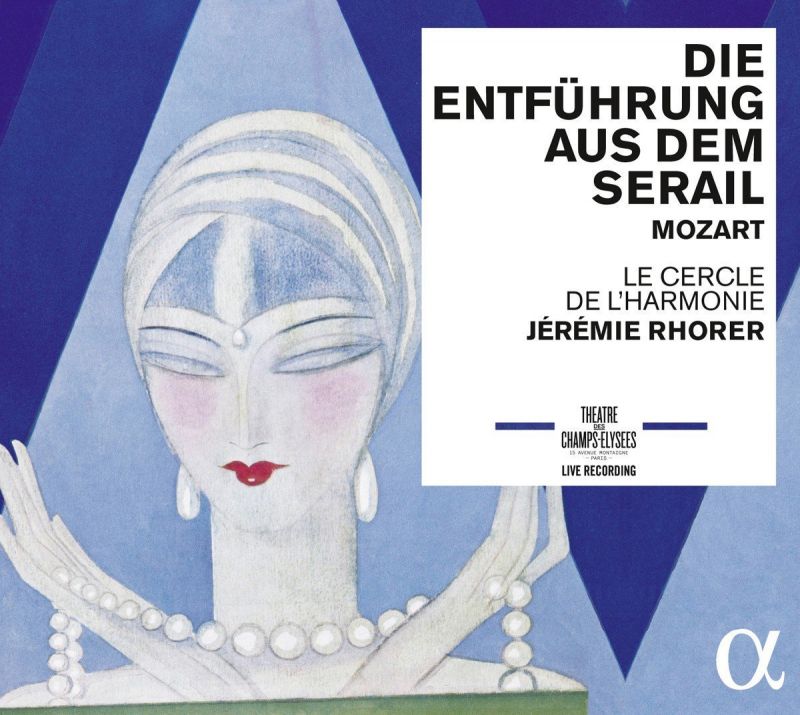MOZART Die Entführung aus dem Serail
View record and artist detailsRecord and Artist Details
Composer or Director: Wolfgang Amadeus Mozart
Genre:
Opera
Label: Alpha
Magazine Review Date: 09/2016
Media Format: CD or Download
Media Runtime: 121
Mastering:
DDD
Catalogue Number: ALPHA242

Tracks:
| Composition | Artist Credit |
|---|---|
| (Die) Entführung aus dem Serail, '(The) Abduction from the Seraglio' |
Wolfgang Amadeus Mozart, Composer
(Le) Cercle de l'Harmonie Christoph Quest, Pasha Selim, Speaker David Portillo, Pedrillo, Tenor Ensemble Aedes Jane Archibald, Konstanze, Soprano Jérémie Rhorer, Conductor Mischa Schelomianski, Osmin, Bass Norman Reinhardt, Belmonte, Tenor Rachele Gilmore, Blonde, Soprano Wolfgang Amadeus Mozart, Composer |
Author: David Vickers
Jane Archibald sings Konstanze’s set pieces with admirable dignity (a lovely ‘Traurigkeit’ with flawlessly shaped woodwinds) and resolute virtue (‘Marten aller Arten’, in which the concertante quartet play beautifully but tutti orchestral contributions seem to lack Sturm und Drang vigour until the aria reaches its climactic stages); this is not mere postulating created by hammed-up lamentation or confrontation but a perceptive realisation of this Samuel Richardson-like heroine. Norman Reinhardt discreetly conceals traces of a bigger voice in Belmonte’s quicker coloratura phrases in ‘O wie ängstlich’, although otherwise his depiction of the would-be rescuer’s shifting emotions of ardent sentimentality and naive hopefulness are spot-on (and every detail of instrumental colour and emotional expression is realised neatly by Rhorer and his orchestra).
Mischa Schelomianski not only has Osmin’s obligatory low notes but sings them articulately, and characterises the villain with an endearing touch of humour. Rachele Gilmore’s sweet singing in ‘Durch Zärtlichkeit’ makes Blonde seem demure rather than feisty (the soft highest notes wobble just a little, but that’s inevitable in a live performance), and her chiding of the grumpy Osmin is lightly comical (as it should be). David Portillo performs Pedrillo’s ‘In Mohrenland gefangen war’ elegantly – but did some of the Parisian audience really have to clap after it? Clearly it is their fault that Osmin wakes up sober enough to foil the lovers’ escape plot.
The clandestine reunion of all four escapees in the quartet at the end of Act 2 is one of the supreme miracles of Mozart’s genius as a musical dramatist, and this radiant performance touchingly conveys its microcosm of bliss, love, jealousy, reconciliation and hope. But although the spoken dialogues between the singers and actor Christoph Quest (Pasha Selim) are effectively conversational and dramatic enough, they are hindered by severe abridgement, which too often in important scenes obscures the nuances, motivations and reactions of characters.
Nevertheless, Rhorer’s astute pacing of the musical drama, consistently persuasive tempi, stylish sculpting of orchestral subtleties and sensible casting of singers who prove to be suitable for the vocal and dramatic demands of their roles all means that this very enjoyable recording arguably has an advantage of musical consistency over other recent versions.
Discover the world's largest classical music catalogue with Presto Music.

Gramophone Digital Club
- Digital Edition
- Digital Archive
- Reviews Database
- Full website access
From £8.75 / month
Subscribe
Gramophone Full Club
- Print Edition
- Digital Edition
- Digital Archive
- Reviews Database
- Full website access
From £11.00 / month
Subscribe
If you are a library, university or other organisation that would be interested in an institutional subscription to Gramophone please click here for further information.




